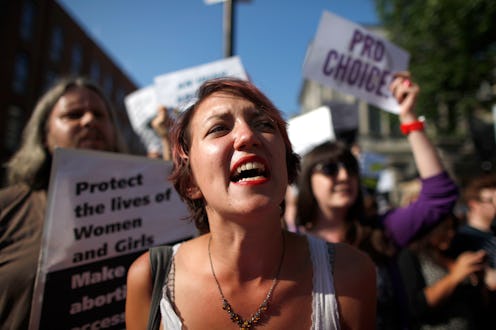News
Will Irish Politicians Repeal The Abortion Ban?
The abortion rights movement in Ireland has grabbed onto the lingering progressive momentum following the nationwide vote to legalize same-sex marriage, but top politicians there are dragging their feet when it comes to approving a referendum to repeal Ireland's onerous Eighth Amendment. The progressive pressure, however, has become international. On Monday, a United Nations committee recommended an abortion referendum in Ireland, calling the nation's existing "highly restrictive legislation" on abortion a danger to Irish women and the doctors who treat them.
"[The Committee on Economic, Social and Cultural Rights] is particularly concerned at the criminalisation of abortion, including in the cases of rape and incest and of risk to the health of a pregnant woman," the committee wrote in its concluding statements. The committee urged leaders of Fine Gael, the current party in power, to "take all necessary steps, including a referendum on abortion, to revise its legislation."
While a referendum to repeal the Eighth Amendment — which grants equal rights to the unborn from the moment of fertilization, thereby outlawing abortion in most cases — is the end goal for groups such as the Abortion Rights Campaign and the National Women’s Council of Ireland, there may be abortion legislation to fix in the meantime. The U.N. committee concluded the Protection of Life During Pregnancy Act of 2013, which allows abortion when a woman's life is at risk due to physical or mental illness, needs a serious overhaul.
There are currently no exceptions for abortion in the cases of rape, incest or fetal abnormality in Ireland. And although the Protection of Life Act, triggered by the death of Savita Halappanavar, who was denied an abortion in 2012 despite miscarrying a non-viable fetus, was supposed to allow doctors more room to treat their pregnant patients without fear of imprisonment, the new law has done little to protect women and their doctors. Patients still need two doctors to sign off on an abortion in a medical emergency, and three doctors in cases of potential suicide risk — adding so much red tape that many physicians may still feel like their hands are tied by the law.
"[The U.N. committee] is particularly concerned at the criminalization of abortion, including in the cases of rape and incest and of risk to the health of a pregnant woman," the concluding statements read. "[And] the lack of legal and procedural clarity on what constitutes a real substantive risk to the life, as opposed to the health, of the pregnant woman."
Despite the international outcry, the nation's leaders have no plans to bring an abortion referendum to a national vote anytime soon. "There will be no referendum of any description between now and the next general election [in 2016] — that's quite clear," Brendan Howlin, the Irish Minister for Public Expenditure, told the Irish Examiner on Tuesday.
And while Howlin reiterated that Ireland's Labor Party will include the repeal of the Eighth Amendment in its next election plank, Ireland's more conservative political parties have no intention of removing the nation's abortion ban. In late May, Taoiseach Enda Kenny, Ireland's prime minister, told his fellow politicians "there will not be a referendum on this issue in the lifetime of this Government."
Kenny, who identifies as pro-life, also argued that Ireland's abortion ban shouldn't be removed entirely. "I do not believe in abortion on demand, but there are very sensitive stories in respect of fatal fetal abnormalities and other issues,’’ he told the Dáil. "However, it is not a case of repealing the eighth amendment and that everybody will be happy afterwards."
The new U.N. report comes just a few weeks after Amnesty International launched its first campaign in Ireland to repeal the Eighth Amendment. In its coinciding report, She's Not a Criminal, the human rights group found the Irish government routinely forced pregnant patients experiencing severe bleeding, or carrying non-viable fetuses and fetuses with severe fetal impairments, to seek abortion care abroad.
"If you are in a Savita situation you either call a lawyer, call the media or get on a plane. You get out of here [Ireland]," Irish physician Dr. Peadar O’Grady states in the report. "The women who are actively bleeding, they are Savita. There is always risk of infection when there is bleeding, that is what happened to Savita."
"Ireland’s draconian laws have created a climate of fear where counselors can be fined for telling women how to seek medical care, and as a result some women are avoiding doctors altogether," added Colm O'Gordon, executive director of Amnesty International Ireland. He criticized the Irish government for being "indifferent to the suffering involved."
Roughly 4,000 Irish women travel to England and Wales each year to obtain an abortion, according to the latest figures from the U.K. Department of Health, though the actual total may be higher. The Abortion Rights Campaign estimates that 12 Irish women leave the country each day for an abortion.
Images: Getty Images (2)
